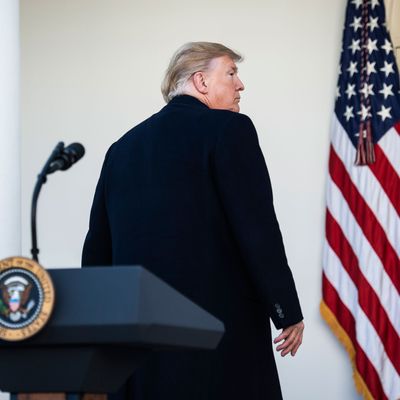
Presidential candidates often remind the public of leaders from ages past. John McCain’s independent streak — and high-minded jingoism — led pundits to liken him to Theodore Roosevelt. Barack Obama’s oratorical gifts and Illinois roots invited analogies to Abraham Lincoln. Donald Trump’s political stylings, meanwhile, evoked memories of our people’s original civic leader — the large, angry ape.
“In many ways the performances of Donald Trump remind me of male chimpanzees and their dominance rituals,” the anthropologist Jane Goodall infamously opined in the summer of 2016. “In order to impress rivals, males seeking to rise in the dominance hierarchy perform spectacular displays: stamping, slapping the ground, dragging branches, throwing rocks. The more vigorous and imaginative the display, the faster the individual is likely to rise in the hierarchy, and the longer he is likely to maintain that position.”
Goodall was far from alone in this assessment. In his paper “The Appeal of the Primal Leader: Human Evolution and Donald J Trump,” Northwestern University social psychologist Dan McAdams argued that the mogul embodied “the social dominance form of human leadership” — and likened Trump’s Twitter tantrums to the violent rituals performed by ruling chimps.
But one didn’t need a degree in evolutionary psychology to appreciate the primordial nature of Trump’s appeal. The mogul’s assertions of alpha-male status weren’t the subtext of his debate performances; they were the text. At an early showdown in Las Vegas, Trump articulated the core argument of his candidacy: Only a tough, strong man could be trusted to secure America’s border — and Jeb Bush was no such man.
“I think Jeb is a very nice person. He’s a very nice person, but we need tough people,” Trump explained. “Jeb said when they come across the southern border, they come as an act of love … We need a toughness. We need a strength. We’re not respected as a nation anymore. And if we don’t get it back fast, we’re just going to go weaker, weaker, and just disintegrate.”
“You’re not going to be able to insult your way to the presidency,” an exasperated Bush replied. “That’s not gonna happen.”
Months later, Jeb Bush’s political career was over — and the presumptive GOP alpha male was literally touting the size of his penis, as his vanquished rivals looked on in despair.
Trump assembled his base by humiliating his enemies. Then, he won over his Republican skeptics by humiliating theirs. The mogul’s defeat of Hillary Clinton transformed all his defects into virtues: His dearth of tact and competence only served to amplify the indignity of blue America’s loss. John Kasich might have been able to beat “the libs,” but only Trump could truly “own” them.
Throughout his first two years in office, the president broke many promises and suffered plenty of defeats. But he never gave the GOP faithful serious cause for doubting his toughness on immigration, or capacity to bring liberals low.
Until he picked a high-profile, weeks-long fight over border security with a liberal, septuagenarian woman from San Francisco — and got “cucked” up beyond all recognition.
It is now clear that Trump’s “border wall” shutdown was an own goal of historic proportions. The president’s weakest moments (in terms of job approval) have come when he has pursued unpopular right-wing policy goals — unsuccessfully — thereby alienating the general public, and disappointing the conservative base, simultaneously. With the shutdown, Trump took the art of the lose-lose opportunity to new heights. Few propositions isolate the Trumpen proletariat from the rest of the electorate more comprehensively than “it is good for a president to deliberately sabotage the federal government, so as to coerce Democrats into funding a border wall.” And few spectacles could cause the Republican base more distress than the sight of Donald Trump bending the knee to Nancy Pelosi and insubordinate government workers.
During his declaration of surrender in the Rose Garden Friday, Trump went so far as to claim that his wall was never intended to be literal. “We do not need 2,000 miles of concrete wall from sea to shining sea,” the president said. “Our proposed structures will be in predetermined high-risk locations that have been specifically identified by the Border Patrol to stop illicit flows of people and drugs. No border security plan can ever work without a physical barrier.”
These remarks raised questions about what the shutdown fight had even been about. Immediately after taking power in January, House Democrats had passed a funding bill that included $1.6 billion for fortifying “physical barriers” in select, high-risk locations. And yet Trump had refused to rebrand this outlay as “wall funding” and declare victory. Instead, he’d insisted, for over a month, that Democrats were refusing to fund “the wall” — even as he began defining that term as steel-bollard fencing, a type of border barrier that Nancy Pelosi’s caucus had voted to fund (albeit, less generously than Trump had requested).
Given how minor the substantive disagreement between the White House and Congress apparently was, the president’s failure to broker a compromise might seem incomprehensible. But this is only the case if one forgets that the wall is a metaphor, not a policy. Its purpose isn’t to secure the border but to fortify the right’s embattled conception of American identity. The wall doesn’t need to run the length of the southern border, or be composed of concrete. But it does need to serve as a monument to red America’s triumph in the culture war. Which is to say, it does need to be something that Democrats cannot vote for without feeling degraded and ashamed. The conservative base doesn’t want any part of a bollard fence that would have Democrats for supporters.
Trump intended his shutdown to be a spectacular display of his tribe’s supremacy in America’s dominance hierarchy. It became the opposite. Now, there’s a good chance that, over the next two years, this presidency is “going to go weaker, weaker, and just disintegrate.”






























